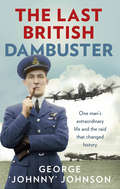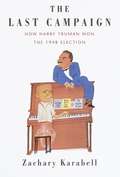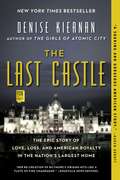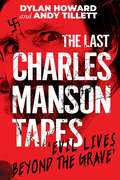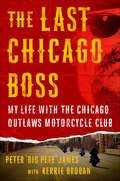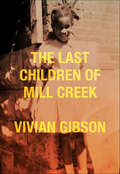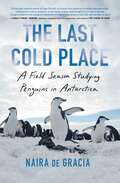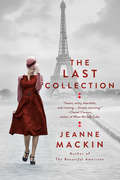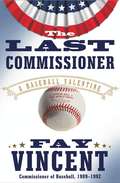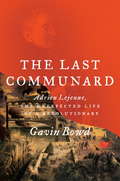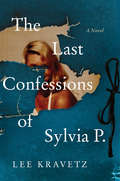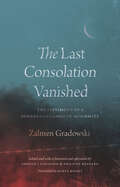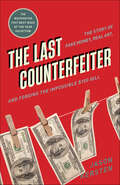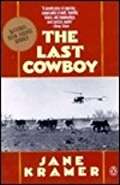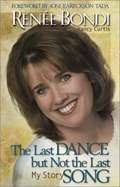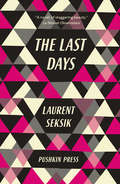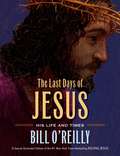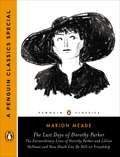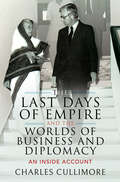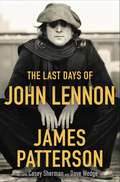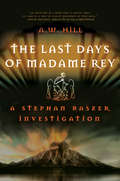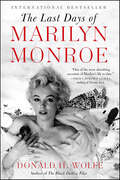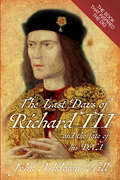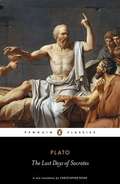- Table View
- List View
The Last British Dambuster: One man's extraordinary life and the raid that changed history
by George Johnny MBEJohnny Johnson has been awarded an MBE for his remarkable services in World War II'I was anxious to fight. Hitler was the bastard who had started all this and he needed sorting out. We were under threat. Everything we stood for: our country, our families and our way of life was being attacked by this maniac. He could not be allowed to win. So for me and many, many others like me, there was no alternative. We were in a pickle and something had to be done.’Johnny Johnson is 95 years old and one of very few men who can recall first-hand the most daring and ingenious air raid of all time. He can also vividly remember his childhood spent working on a farm with his controlling father, the series of events that led him to the RAF and the rigorous training that followed. But it was his decision to join 617 Squadron, and the consequences, that have truly stayed etched in his mind. On 16 May 1943, Johnny, alongside 132 specially selected comrades, took off from Scampton airbase in Lincolnshire. For six weeks they had been trained to fulfil one mission that was near impossible: to destroy three dams deep within Germany’s Ruhr Valley. It was a daring task but, against the odds, Johnny and his crew survived. Sadly, 53 comrades did not.For the first time, Johnny relives every moment of that fatal night – and the devastating aftermath. He recalls with unique wit and insight the difficult training conducted in secrecy, the race against time to release the bombs, and the sheer strength and bravery shown by a small unit faced with great adversity and uncertainty. Embodying a whole squadron, and leaving a lasting legacy for generations to come, Johnny’s story is like no other.
The Last Campaign: How Harry Truman Won the 1948 Election
by Zachary KarabellThe story of Truman's surprising victory over Thomas E. Dewey.
The Last Castle: The Epic Story of Love, Loss, and American Royalty in the Nation's Largest Home
by Denise Kiernan“A soaring and gorgeous American story” (Karen Abbott) from the author of the New York Times bestselling The Girls of Atomic City. The fascinating true story behind the magnificent Gilded Age mansion Biltmore—the largest, grandest residence ever built in the United States.The story of Biltmore spans World Wars, the Jazz Age, the Depression, and generations of the famous Vanderbilt family, and features a captivating cast of real-life characters including F. Scott Fitzgerald, Thomas Wolfe, Teddy Roosevelt, John Singer Sargent, James Whistler, Henry James, and Edith Wharton. Orphaned at a young age, Edith Stuyvesant Dresser claimed lineage from one of New York’s best known families. She grew up in Newport and Paris, and her engagement and marriage to George Vanderbilt was one of the most watched events of Gilded Age society. But none of this prepared her to be mistress of Biltmore House. Before their marriage, the wealthy and bookish Vanderbilt had dedicated his life to creating a spectacular European-style estate on 125,000 acres of North Carolina wilderness. He summoned the famous landscape architect Frederick Law Olmsted to tame the grounds, collaborated with celebrated architect Richard Morris Hunt to build a 175,000-square-foot chateau, filled it with priceless art and antiques, and erected a charming village beyond the gates. Newlywed Edith was now mistress of an estate nearly three times the size of Washington, DC and benefactress of the village and surrounding rural area. When fortunes shifted and changing times threatened her family, her home, and her community, it was up to Edith to save Biltmore—and secure the future of the region and her husband’s legacy. The Last Castle is the unique American story of how the largest house in America flourished, faltered, and ultimately endured to this day.
The Last Charles Manson Tapes: 'Evil Lives Beyond the Grave' (Front Page Detectives Ser.)
by Dylan Howard Andy TillettFifty Years After the Sharon Tate/Labianca Murders, a New and Terrifying Investigation into the Modern Rebirth of Charles Manson&’s Killer Family Perhaps the most notorious American murderer of the twentieth century, Charles Manson&’s legacy extends far beyond his horrific crimes. As the wild-eyed, swastika-tattooed, nightmarishly charismatic leader of the Manson Family, he was convicted of the brutal killings of nine people in 1971 . . . including the Tate-LaBianca murders of seven in Los Angeles over two hot August nights in 1969. He spent the rest of his life in prison, and for the next fifty years preached his twisted philosophies from jail, attracting a whole new batch of freaks to his way of thinking. In The Last Charles Manson Tapes, authors Dylan Howard and Andy Tillett examine the Manson legacy. With brand new interviews with those closest to him, including Manson&’s heirs, friends and followers, experts and historians, and hours of exclusive transcripts of Manson&’s own manic preachings from his prison cell, you&’ll get to view a side of this serial killer few have ever seen. Manson&’s passing in 2017 has sparked into action a new generation of killer disciples, obsessed with the evil slaying spree he ordered and determined to carry on his &“Helter Skelter&” vision of an apocalyptic war. With the author&’s on-the-ground investigation, learn how the man once described as &“the most dangerous man in America&” may yet live up to that name.
The Last Chicago Boss: My Life with the Chicago Outlaws Motorcycle Club
by Kerrie Droban Peter "Big JamesA legend in the biker community, Peter “Big Pete” James was the most revered gangster in the Outlaw Nation. He first perfected his skills with the Hells Angels, the Outlaws’ chief rival, before persuading thousands of disgruntled members from splintered Outlaws chapters to unite. Together, they formed a powerful criminal syndicate involved in extortion, contract murders, drugs and arms trafficking, money laundering and assassinations. Then a shocking medical diagnosis knocked James sideways, forcing him to face a new life on the outside of the organization he built, dodging snitches, federal law enforcement, and contract hits.In The Last Chicago Boss, James provides a startling and unprecedented expose into the inner workings of the Outlaw Nation from the unique perspective of its renowned leader, all brought to life through never-before-revealed interviews, police files, wiretaps, recordings, and trial transcripts.
The Last Children of Mill Creek
by Vivian GibsonA bestselling memoir of a vibrant childhood spent in a thriving St. Louis African American community before &“urban renewal&” changed everything. Vivian Gibson grew up in Mill Creek Valley, a segregated working-class neighborhood in St. Louis that was razed in 1959 to build a highway, an act of racism disguised under urban renewal as &“progress.&” A moving memoir of family life at a time very different from the present, The Last Children of Mill Creek chronicles the everyday lived experiences of Gibson&’s large family―her seven siblings, her crafty, college-educated mother, and her hard-working father―and the friends, shop owners, church ladies, teachers, and others who made Mill Creek into a warm, tight-knit African American community. In Gibson&’s words, &“This memoir is about survival, as told from the viewpoint of a watchful young girl―a collection of decidedly universal stories that chronicle the extraordinary lives of ordinary people.&” Winner of a Missouri Humanities award for literary achievement, The Last Children of Mill Creek is an important book for anyone interested in urban development, race, and community history―or for anyone who was once a child. Praise for The Last Children of Mill Creek2022 Missouri Author of the Year WinnerMissouri's &“Great Reads from Great Places&” Selection for the 2023 National Book Festival &“This is a story borne aloft by the sheer human joy of storytelling, of memory, of tender love for a mother and a father and for a vanished time and place. It is a book that, while steadfastly refusing the American fiction of color blindness, just as steadfastly refuses to portray Black life through the single warped lens of white-induced pain.&” —TheLos Angeles Review of Books
The Last Cold Place: A Field Season Studying Penguins in Antarctica
by Naira de GraciaLab Girl meets Why Fish Don&’t Exist in this brilliant, fascinating memoir about a young scientist&’s experience studying penguins in Antarctica—a firsthand account of the beauty and brutality of this remote climate, the direct effects of climate change on animals, and the challenges of fieldwork.Naira de Gracia&’s The Last Cold Place offers a dramatic, captivating window into a once-in-a-lifetime experience: a season living and working in a remote outpost in Antarctica alongside seals, penguins, and a small crew of fellow field workers. In one of the most inhospitable environments in the world (for humans, anyway), Naira follows a generation of chinstrap penguins from their parents&’ return to shore to build nests from pebbles until the chicks themselves are old enough to head out to sea. In lively and entertaining anecdotes, Naira describes the life cycle of a funny, engaging colony of chinstrap penguins whose food source (krill, or small crustaceans) is powerfully affected by the changing ocean. Weaving together the history of Antarctic exploration with climate science, field observations, and her own personal journey of growth and reflection, The Last Cold Place illuminates the complex place that Antarctica holds in our cultural imagination—and offers a rare glimpse into life on this uninhabited continent.
The Last Collection: A Novel of Elsa Schiaparelli and Coco Chanel
by Jeanne MackinAn American woman becomes entangled in the intense rivalry between iconic fashion designers Coco Chanel and Elsa Schiaparelli in this captivating novel from the acclaimed author of The Beautiful American.Paris, 1938. Coco Chanel and Elsa Schiaparelli are fighting for recognition as the most successful and influential fashion designer in France, and their rivalry is already legendary. They oppose each other at every turn, in both their politics and their designs: Chanel’s are classic, elegant, and practical; Schiaparelli’s bold, experimental, and surreal.When Lily Sutter, a recently widowed young American teacher, visits her brother, Charlie, in Paris, he insists on buying her a couture dress—a Chanel. Lily, however, prefers a Schiaparelli. Charlie’s beautiful and socially prominent girlfriend soon begins wearing Schiaparelli’s designs as well, and much of Paris follows in her footsteps. Schiaparelli offers budding artist Lily a job at her store, and Lily finds herself increasingly involved with Schiaparelli and Chanel’s personal war. Their fierce competition reaches new and dangerous heights as the Nazis and the looming threat of World War II bear down on Paris.
The Last Commissioner: A Baseball Valentine
by Fay VincentOn a beautiful July morning in 1991, three men gathered in a hotel suite for an informal breakfast and conversation. The discussion ranged widely over events and characters of the past, famous names and fabled accomplishments flowing along with the coffee and juice. Two of them, Ted Williams and Joe DiMaggio, were the ultimate symbols of athletic glory for generations of American men. The third man, Fay Vincent, was living a dream, sitting with and asking questions of his boyhood heroes. Fay Vincent never set out to be the commissioner of baseball. He got into the game alongside his good friend A. Bartlett Giamatti, as deputy commissioner, when Giamatti was named to the sport's highest office in 1989. They spent their first spring and summer dealing with Pete Rose's gambling, and Vincent's legal expertise complemented his friend's moral thunder. But that was to be their only season working side by side, as Bart Giamatti's heart gave out just days after the announcement of the Rose suspension. Vincent found himself the only logical candidate to fill a position as guardian of the best interests of the game he loves. In The Last Commissioner: A Baseball Valentine, Vincent takes us along for the ultimate fan's fantasy camp. As commissioner, he got to talk baseball with the likes of Yogi Berra, Larry Doby, Warren Spahn, Ernie Banks, Eddie Lopat, Whitey Ford, and Henry Aaron. He brought his legal training to bear on the delicate issue of whether Roger Clemens uttered the magic word that would justify his being tossed out of a playoff game (and it's not the word you think). He was one of the few outsiders at the annual Hall of Fame banquet for the new inductees and their immortal peers, where he watched, amazed, as Johnny Mize demonstrated to Ralph Kiner his method of hitting an inside pitch -- a piece of advice from forty years past. And he brought equal respect and attention to the greats of the Negro Leagues, listening to the gracefully told stories of Joe Black and Buck O'Neil, slowly learning how Slick Surratt earned his nickname, hearing Jimmie Crutchfield give as good a definition of a well-lived life as we will ever know. Vincent shares these stories and more: his high regard for umpires, instilled in his youth by his father, an NFL official and respected local ump; his close relations with the Bush family, forged in a summer spent working in the oil fields with his schoolmate Bucky Bush, the 41st president's brother (and 43rd president's uncle); his unusual experiences with the relentless George Steinbrenner, including the famous meeting where the Yankees owner was facing a two-year suspension and plea-bargained it down to a lifetime ban. Vincent also gives his candid views on the state of baseball today, firm in his belief that the game will survive its current leadership and even prosper. Through it all, Vincent's deep love of baseball shines through. His most remarkable accomplishment as commissioner may have been to emerge from the office with his fandom intact. The Last Commissioner is truly a valentine to the game, written with the insight and vision that comes from the lofty perch of the ultimate front-row seat.
The Last Communard: Adrien Lejeune, the Unexpected Life of a Revolutionary
by Gavin BowdThe story of an unexpected heroThe Last Communard offers a brilliant, striking portrait of revolutionary Europe through a remarkable personal story.In 1871, Adrien Lejeune fought on the barricades of the Paris Commune. He was imprisoned for treason when the Commune fell and narrowly avoided execution for his role in the struggle for a new future. In later life, he immigrated to Soviet Russia, finding fame as a revolutionary icon. In his native country, he was vaunted as a hero, a touchstone of revolutions past during France's interwar dramas.Abandoned by the Soviet regime, he languished, fortunes foundering, in Russia. Having led a long and extraordinary life, he died in Siberia in 1942 while fleeing Moscow as the Nazi armies swept across western Russia. It was another thirty years before he returned to Paris, his ashes coming to rest in the Communards' plot of the Père Lachaise cemetery, on the centennial of the uprising, a symbol of France's undying radical tradition.Gavin Bowd's stunning narrative shows how an individual can be swept up in the fierce tides of history, and at the same time be defined by his own efforts to force those tides into a different, and better, course. Lejeune's life captures war and revolution in a tumultuous period of European history.From the Hardcover edition.
The Last Confessions of Sylvia P.: A Novel
by Lee Kravetz“Lee Kravetz has created a bit of a miracle, a plot-driven literary puzzle box whose mystery lives in both its winding approach to history and its wonderous story. It’s a book full of ideas about inspiration and a love for language that translates across borders, physical and generational.”—Adam Johnson, Winner of the Pulitzer Prize for Fiction for The Orphan Master's SonBlending past and present, and told through three unique interwoven narratives that build on one another, a daring and brilliant debut novel that reimagines a chapter in the life of Sylvia Plath, telling the story behind the creation of her classic semi-autobiographical novel, The Bell Jar.A seductive literary mystery and mutigenerational story inspired by true events, The Last Confessions of Sylvia P. imaginatively brings into focus the period of promise and tragedy that marked the writing of Sylvia Plath’s modern classic The Bell Jar. Lee Kravetz uses a prismatic narrative formed from three distinct fictional perspectives to bring Plath to life—that of her psychiatrist, a rival poet, and years later, a curator of antiquities. Estee, a seasoned curator for a small Massachusetts auction house, makes an astonishing find: the original manuscript of Sylvia Plath’s semi-autobiographical novel, The Bell Jar, written by hand in her journals fifty-five years earlier. Vetting the document, Estee will discover she’s connected to Plath’s legacy in an unexpected way. Plath’s psychiatrist, Dr. Ruth Barnhouse, treats Plath during the dark days she spends at McLean Hospital following a suicide attempt, and eventually helps set the talented poet and writer on a path toward literary greatness. Poet Boston Rhodes, a malicious literary rival, pushes Plath to write about her experiences at McLean, tipping her into a fatal spiral of madness and ultimately forging her legacy. Like Michael Cunningham’s The Hours, Paula McLain’s The Paris Wife, and Theresa Anne Fowler’s Z: A Novel of Zelda Fitzgerald, The Last Confessions of Sylvia P. bridges fact and fiction to imagine the life of a revered writer. Suspenseful and beautifully written, Kravetz’s masterful literary novel is a hugely appealing read.
The Last Consolation Vanished: The Testimony of a Sonderkommando in Auschwitz
by Zalmen GradowskiA unique and haunting first-person Holocaust account by Zalmen Gradowski, a Sonderkommando prisoner killed in Auschwitz. On October 7, 1944, a group of Jewish prisoners in Auschwitz obtained explosives and rebelled against their Nazi murderers. It was a desperate uprising that was defeated by the end of the day. More than four hundred prisoners were killed. Filling a gap in history, The Last Consolation Vanished is the first complete English translation and critical edition of one prisoner’s powerful account of life and death in Auschwitz, written in Yiddish and buried in the ashes near Crematorium III. Zalmen Gradowski was in the Sonderkommando (special squad) at Auschwitz, a Jewish prisoner given the unthinkable task of ushering Jewish deportees into the gas chambers, removing their bodies, salvaging any valuables, transporting their corpses to the crematoria, and destroying all evidence of their murders. Sonderkommandos were forcibly recruited by SS soldiers; when they discovered the horror of their assignment, some of them committed suicide or tried to induce the SS to kill them. Despite their impossible situation, many Sonderkommandos chose to resist in two interlaced ways: planning an uprising and testifying. Gradowski did both, by helping to lead a rebellion and by documenting his experiences. Within 120 scrawled notebook pages, his accounts describe the process of the Holocaust, the relentless brutality of the Nazi regime, the assassination of Czech Jews, the relationships among the community of men forced to assist in this nightmare, and the unbearable separation and death of entire families, including his own. Amid daily unimaginable atrocities, he somehow wrote pages that were literary, sometimes even lyrical—hidden where and when one would least expect to find them. The October 7th rebellion was completely crushed and Gradowski was killed in the process, but his testimony lives on. His extraordinary and moving account, accompanied by a foreword and afterword by Philippe Mesnard and Arnold I. Davidson, is a voice speaking to us from the past on behalf of millions who were silenced. Their story must be shared.
The Last Counterfeiter: The Story of Fake Money, Real Art, and Forging the Impossible $100 Bill
by Jason KerstenThe true story of the mastermind counterfeiter who forged millions, replicated the impossible 1996 note, dodged the Secret Service, but couldn't escape the pain of his broken family. When Art Williams Jr.’s father abandoned the family and his bipolar mother lost her mind, a life of crime in Chicago quickly claimed him. Parking meter theft led to robbing drug dealers before Art fatefully met a man nicknamed DaVinci who taught him the skill of counterfeiting money. After just a few years, Art would print millions of counterfeit bills, selling them to criminal organizations, all while trying to raise a family on the side.Art’s greatest challenge arose when the Treasury Department released the 1996 note, the most intricate and secure bill ever created. Between painstakingly perfecting a new hundred-dollar bill to bypass the naked eye and security measures alike, Art was slipping by the Secret Service hunting him, and searching for his long-lost father, a path that ultimately led to his undoing.Prison may have been the end, especially as Art Jr. found himself behind bars sharing a cell with his own son, but with the same creativity and ambition that locked him up, Art reinvented himself as a professional artist. Art’s unbelievable journey extends beyond a life of crime to one of second chances, healing family wounds, and ultimately, triumph. Fans of Catch Me If You Can and The Art Thief won't want to miss this unforgettable caper story.
The Last Cowboy
by Jane KramerPortrays the life of a man who strives to be "a proper cowboy" despite radical changes which have propelled the Old West into a New Southwest characterized by industrialized agribusiness.<P><P> 'The West that Henry mourned belonged to the Western movie, where the land and the cattle went to their proper guardians and brought a fortune in respect and power. It was a West where the best cowboy got to shoot the meanest outlaw, woo the prettiest schoolteacher, bed her briefly to produce sons, and then ignore her for the finer company of other cowboys - a West as sentimental and as brutal as the people who made a virtue of that curious combination of qualities and called it the American experience.' From the Introduction: Henry Blanton is the 'last cowboy' of Jane Kramer's classic portrait, the failed hero of his own mythology, the man who ends an era for himself. His story - his flawed, funny, and in the end tragic efforts to be a proper cowboy, 'expressin' right' in a world where the range is a feed yard and college boys run ranches from air-conditioned Buicks -is the story of a country coming of age in great promise and greater disappointment. A hundred and fifty miles up the highway from agri-business Amarillo, Henry claimed the extravagant prerogatives of a free man on a horse. He rode his own frontier, decked out in his vigilance and his honour, until the shocking moment when in the person of Henry Blanton the West and the Western had a showdown.<P> Winner of the National Book Award
The Last Dance But Not the Last Song: My Story
by Renee BondiRenee had it all... a dream job teaching high school choir and a wedding to plan for. life was good until a freak accident left her parilized from the shoulders down. inspiring story of faith and triumph
The Last Days
by Andre Naffis-Sahely Laurent Seksik"He looked long and deep into her eyes. "I'll go first," he said. "You'll follow me... if that's what you want." On the 22nd February 1942 Stefan Zweig, one of the most popular authors of his generation, committed suicide with his wife Lotte. The final, desperate gesture of this great writer has fascinated ever since. Zweig was an exile, driven from his home in Austria by the Nazis. Fleeing first to London, then New York, trying always to escape both those who demonised him and those who acclaimed him, he eventually took his young bride to Brazil, where they were haunted by the life they'd been forced to abandon and by accounts of the violence in Europe. Blending reality and fiction this novel tells the story of the great writer's final months. Laurent Seksik uncovers the man's hidden passions, his private suffering, and how he and his wife came to end their lives one peaceful February afternoon.
The Last Days Of Jesus: His Life And Times
by Bill O'Reilly William Low Cobalt Illustrations Studio StaffTwo thousand years ago, Jesus walked across Galilee; everywhere he traveled he gained followers. His contemporaries are familiar historical figures: Julius Caesar, Caesar Augustus, Herod the Great, Pontius Pilate. It was an era of oppression, when every man, woman, and child answered to the brutal rule of Rome. In this world, Jesus lived, and in this volatile political and historical context, Jesus died--and changed the world forever. <P><P> Adapted from Bill O'Reilly's bestselling historical thriller Killing Jesus,The Last Days of Jesus is a riveting, fact-based account of the life and times of Jesus.
The Last Days of Dorothy Parker: The Extraordinary Lives of Dorothy Parker and Lillian Hellman and How Death Can Be Hell on Friendship (A Penguin Classics Special)
by Marion MeadeDorothy Parker biographer Marion Meade shares insight into the last days in the life of Dorothy Parker--the horrible and the hilarious--including her colorful friendship with Lillian Hellman, and the bizarre afterlife of Parker's remains from a file cabinet on Wall Street to a small burial site by the NAACP office in Baltimore. The Volney was a dignified residence hotel, favored by older women and their dogs, on Manhattan's Upper East Side. Dorothy Parker died there, of a heart attack, on June 7, 1967. She was seventy-three and had been famous for almost half a century. As befitted a much-loved humorist, poet, and storywriter, the New York Times announced her exit in a front-page obituary. This was followed by a star-studded memorial service, also reported in the paper, which was attended by some 150 of her friends and admirers. More than twenty years later, on October 20, 1988, Parker was buried in Baltimore, in a memorial garden at the national headquarters of the NAACP. Why did it take more than two decades for Dorothy Parker to get a decent burial? What accounts for her macabre Edgar Allan Poe-style ending, arguably one of the most ghoulish in modern literary history? And just what happened to her during those twenty-one years? Dorothy Parker biographer Marion Meade draws from new research to portray Parker in her last years and last days, with an emphasis on her posthumous existence. The story also features Parker's enduring friendship of over thirty years with playwright and screenwriter Lillian Hellman, along with other notable figures in Parker's circle, including Dashiell Hammett and John O'Hara. Always riotous and occasionally ghastly, The Last Days is utterly and completely Dorothy Parker.
The Last Days of Empire and the Worlds of Business and Diplomacy: An Inside Account
by Charles CullimoreA personal story, a colorful travelogue and an inside experience of politics and international relations, which includes a poignant 'imperial' sidelight with the discovery of his grandmother's grave in India.Charles Cullimore's was a varied life from the end of the British Empire to high-level business and finally with major roles in post-imperial British policy. He rounded off a career appropriately by lecturing at the School of Oriental and African Studies in the University of London, underpinning academic study with his hands-on experience in international diplomacy. The account is modest, graphic, full of incident, personality and anecdote, and face-to-face encounters with leading actors. After the 'Devonshire course' for entrants to the Colonial Service came appointment to Tanganyika and here is an intimate personal and 'official' account of district administration and the rise of TANU - Tanganyika African National Union - and decolonisation. The moving letter from Julius Nyerere reproduced in the text sums up a close relationship at the end of empire between the administration and the rising politicians assuming power at decolonisation when Tanganyika became Tanzania shortly after. A spell at ICI in 'personnel' followed in Scotland, Malaysia and Singapore. And then back to government service in the Foreign and Commonwealth Office focussed on Overseas Development, followed by a posting to Bonn at the height of the Cold War. The author came back to British Commonwealth service as Head of Chancery in India, Deputy High Commissioner in Australia, Head of the Central African Department in the FCO covering relations with the 'front-line States' and their conflict with South Africa. Finally, he was High Commissioner in Uganda at the time of state-recovery under Museveni - an intimate account full of fascinating personal contact. A personal story, a colorful travelogue and an inside experience of politics and international relations, which includes a poignant 'imperial' sidelight with the discovery of his grandmother's grave in India.
The Last Days of Empire and the Worlds of Business and Diplomacy: An Inside Account
by Charles CullimoreA personal story, a colorful travelogue and an inside experience of politics and international relations, which includes a poignant 'imperial' sidelight with the discovery of his grandmother's grave in India.Charles Cullimore's was a varied life from the end of the British Empire to high-level business and finally with major roles in post-imperial British policy. He rounded off a career appropriately by lecturing at the School of Oriental and African Studies in the University of London, underpinning academic study with his hands-on experience in international diplomacy. The account is modest, graphic, full of incident, personality and anecdote, and face-to-face encounters with leading actors. After the 'Devonshire course' for entrants to the Colonial Service came appointment to Tanganyika and here is an intimate personal and 'official' account of district administration and the rise of TANU - Tanganyika African National Union - and decolonisation. The moving letter from Julius Nyerere reproduced in the text sums up a close relationship at the end of empire between the administration and the rising politicians assuming power at decolonisation when Tanganyika became Tanzania shortly after. A spell at ICI in 'personnel' followed in Scotland, Malaysia and Singapore. And then back to government service in the Foreign and Commonwealth Office focussed on Overseas Development, followed by a posting to Bonn at the height of the Cold War. The author came back to British Commonwealth service as Head of Chancery in India, Deputy High Commissioner in Australia, Head of the Central African Department in the FCO covering relations with the 'front-line States' and their conflict with South Africa. Finally, he was High Commissioner in Uganda at the time of state-recovery under Museveni - an intimate account full of fascinating personal contact. A personal story, a colorful travelogue and an inside experience of politics and international relations, which includes a poignant 'imperial' sidelight with the discovery of his grandmother's grave in India.
The Last Days of John Lennon
by James PattersonThe greatest true-crime story in music history, as only James Patterson can tell it. With the Beatles, John Lennon surpasses his youthful dreams, achieving a level of superstardom that defies classification. “We were the best bloody band there was,” he says. “There was nobody to touch us.” <P><P>Nobody except the original nowhere man, Mark David Chapman. Chapman once worshipped his idols from afar—but now harbors grudges against those, like Lennon, whom he feels betrayed him. He’s convinced Lennon has misled fans with his message of hope and peace. And Chapman’s not staying away any longer. By the summer of 1980, Lennon is recording new music for the first time in years, energized and ready for it to be “(Just Like) Starting Over.” He can’t wait to show the world what he will do. <P><P>Neither can Chapman, who quits his security job and boards a flight to New York, a handgun and bullets stowed in his luggage. The greatest true-crime story in music history, as only James Patterson can tell it. Enriched by exclusive interviews with Lennon’s friends and associates, including Paul McCartney, The Last Days of John Lennon is the thrilling true story of two men who changed history: One whose indelible songs enliven our world to this day—and the other who ended the beautiful music with five pulls of a trigger. <P><P><b>A New York Times Bestseller</b>
The Last Days of Madame Rey: A Stephan Raszer Investigation
by A.W. HillIn The Last Days of Madame Rey, Stephen Raszer—sleuth, scholar, shaman, and private eye—goes to hell and back to save the soul of his client's son, an ambitious and sexually conflicted young lawyer named Fortis Cohn. Fortis has drifted to the wrong side of the karmic tracks, and Raszer has been hired to free him from the spell cast by a neo–Nazi demagogue. On his quest to expose the spiritual hucksters who have duped Fortis, Raszer encounters more than Old and New World mysticism. A series of eerily unnatural earthquakes is rippling through Northern California, and it's possible that the cult behind Fortis's disappearance may be involved. Meanwhile, a cryptic message is left in the hands of a gypsy fortuneteller, and to learn its meaning, Raszer must put his trust in a stunningly sensuous and far too independent–minded operative named April Blessing. He will follow her almost literally to the ends of the earth to unravel the ancient mystery encoded in the gypsy's message. From its pseudo–gnostic predators to its bedazzled souls, The Last Days of Madame Rey is high on humor, rich on adventure, and injected with addictive, heart–stopping suspense.
The Last Days of Marilyn Monroe
by Donald H. WolfeMarilyn Monroe's death has been shrouded in decades of deception, conspiracy, and lies. Donald H. Wolfe has written a startling portrait of the twentieth century's greatest film star that not only redefines her place in entertainment history but also reveals the secret conspiracy that surrounded her last days.In The Last Days of Marilyn Monroe, Wolfe confirms that the tragic actress was a homicide victim. He documents the mode of death, and names those involved and those who participated in the cover-up. Filled with documented revelations, eye-opening information about the dark secret in Marilyn's relationship with John and Robert Kennedy, and shocking details about the many bizarre events that took place at Marilyn's home the day she died, Donald H. Wolfe's remarkable book is the culmination of more than seven years of research. It will change forever the way we view the life—and death—of this great star.
The Last Days of Richard III and the fate of his DNA: The Book that Inspired the Dig
by John Ashdown-HillThe Last Days of Richard III contains a new and uniquely detailed exploration of Richard’s last 150 days. By deliberately avoiding the hindsight knowledge that he will lose the Battle of Bosworth Field, we discover a new Richard: no passive victim, awaiting defeat and death, but a king actively pursuing his own agenda.It also re-examines the aftermath of Bosworth: the treatment of Richard’s body; his burial; and the construction of his tomb. And there is the fascinating story of why, and how, Richard III’s family tree was traced until a relative was found, alive and well, in Canada.Now, with the discovery of Richard’s skeleton at the Greyfrairs Priory in Leicester, England, John Ashdown-Hill explains how his book inspired the dig and completes Richard III’s fascinating story, giving details of how Richard died, and how the DNA link to a living relative of the king allowed the royal body to be identified.
The Last Days of Socrates
by Plato Christopher RoweThe trial and death of Socrates (469-399 BCE) have almost as central a place in Western consciousness as the trial and death of Jesus. In four superb dialogues, Plato provides the classic account. Euthyphro finds Socrates outside the court-house, debating the nature of piety, while the Apology is his robust rebuttal of the charges of impiety and a defence of the philosopher's life. In the Crito, while awaiting execution in prison, Socrates counters the arguments of friends urging him to escape. Finally, in the Phaedo, he is shown calmly confident in the face of death, skilfully arguing the case for the immortality of the soul.
